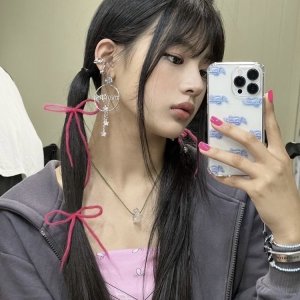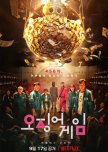A Somehow Refreshingly Cliched Twist on the Battle Royal Trope
I never imagined my first review on this site would be for Squid Game.
I've been a fan of the battle royale trope for as long as I can remember. Battle Royale, the Hunger Games, Alice in Borderland, all are my favorites. I first came across Squid Game through Netflix's Youtube channel and expected to dislike it - at the time, the trailer looked childish with its colorful uniforms and funky looking game regulators with shapes on their helmets. Nevertheless, it stayed on my to watch list, and as the days passed, so did its position on the Netflix Global Top 10 charts. I decided to give it a go.
THE GOOD
What made this drama compelling was its non post-apocalyptic setting, something I'm used to in battle royale, as well as the games. Utilizing games from cherished childhood memories as modes of death was an eerily fresh take. I found the majority vote as a means to an end creative as well, leaving the illusion of choice to both the characters and to us the audience. It's true that actual participation isn't "forced", rather, the preexisting circumstances of each character made the reward money all the more incentivizing. I loved its economic class commentary, moral ambiguity, as well as cinematographic ties to art pieces. Visual artists and fans of thriller like me will definitely enjoy.
THE OK
I found myself persuaded by the acting despite being impartial to the screenwriting. I don't know if this was on purpose, but Gi-hun's face was quite punchable at times. Maybe it was an attempt to portray his gullibility? Not sure, but actor Lee Jung Jae did as well as he could balancing the pathetic yet sympathetic role. I was impressed by Jung Hoyeon's role as Kang Saebyeok (though I'm a little biased since she's been one of my favorite models <3) especially since the idol/model to actress pipeline is so saturated. I wasn't expecting much though. Objectively speaking, her microexpressions really allowed 067's vulnerability to shine through. Stoic characters are surprisingly hard to portray - I'll remember hers for quite a while. Wi Ha Joon makes a pretty officer, but other than a look into the "villain" side of the story, he wasn't offered much substance. Park Hae Soo's role as Sangwoo was memorable and convincing! I kept expecting him to be more morally gray so being caught off guard was pleasant.
THE BAD
This is where I feel most conflicted. Certain deaths were highly predictable just based on screen time and backstory alone. Unfortunately the screenwriting left little room for emotional connection. Sure, deaths were sad, but most of the time they were empty since I barely knew anything about the characters. Halfway through the show the games started to lose meaning. I even think one of them towards the end wasn't a children's game? I was left hoping for something more strategy-based or just a little more depth. Killing occuring outside the games added another level of chaos, as did the small game regulators' scenes, impacting the pacing negatively. The screenwriter didn't do the best job with the masked leaders either; choosing familiarity destroys suspense if not done well, and unfortunately that was the case here for me since I guessed correctly. 9 episodes was not enough. It's obvious to me that this many loose ends means a preplanned second season, which I'm not too enthusiastic about considering the sloppiness towards the end.
In conclusion:
Did I love this show conceptually? Very much yes. Would I recommend watching it? Still, yes, please give it a shot. Do I think it's worth the hype/critical acclaim its been receiving? Not exactly, but it's a major move for a Korean show so I'll celebrate that.
Regardless, Squid Game has left a lasting impression.
I've been a fan of the battle royale trope for as long as I can remember. Battle Royale, the Hunger Games, Alice in Borderland, all are my favorites. I first came across Squid Game through Netflix's Youtube channel and expected to dislike it - at the time, the trailer looked childish with its colorful uniforms and funky looking game regulators with shapes on their helmets. Nevertheless, it stayed on my to watch list, and as the days passed, so did its position on the Netflix Global Top 10 charts. I decided to give it a go.
THE GOOD
What made this drama compelling was its non post-apocalyptic setting, something I'm used to in battle royale, as well as the games. Utilizing games from cherished childhood memories as modes of death was an eerily fresh take. I found the majority vote as a means to an end creative as well, leaving the illusion of choice to both the characters and to us the audience. It's true that actual participation isn't "forced", rather, the preexisting circumstances of each character made the reward money all the more incentivizing. I loved its economic class commentary, moral ambiguity, as well as cinematographic ties to art pieces. Visual artists and fans of thriller like me will definitely enjoy.
THE OK
I found myself persuaded by the acting despite being impartial to the screenwriting. I don't know if this was on purpose, but Gi-hun's face was quite punchable at times. Maybe it was an attempt to portray his gullibility? Not sure, but actor Lee Jung Jae did as well as he could balancing the pathetic yet sympathetic role. I was impressed by Jung Hoyeon's role as Kang Saebyeok (though I'm a little biased since she's been one of my favorite models <3) especially since the idol/model to actress pipeline is so saturated. I wasn't expecting much though. Objectively speaking, her microexpressions really allowed 067's vulnerability to shine through. Stoic characters are surprisingly hard to portray - I'll remember hers for quite a while. Wi Ha Joon makes a pretty officer, but other than a look into the "villain" side of the story, he wasn't offered much substance. Park Hae Soo's role as Sangwoo was memorable and convincing! I kept expecting him to be more morally gray so being caught off guard was pleasant.
THE BAD
This is where I feel most conflicted. Certain deaths were highly predictable just based on screen time and backstory alone. Unfortunately the screenwriting left little room for emotional connection. Sure, deaths were sad, but most of the time they were empty since I barely knew anything about the characters. Halfway through the show the games started to lose meaning. I even think one of them towards the end wasn't a children's game? I was left hoping for something more strategy-based or just a little more depth. Killing occuring outside the games added another level of chaos, as did the small game regulators' scenes, impacting the pacing negatively. The screenwriter didn't do the best job with the masked leaders either; choosing familiarity destroys suspense if not done well, and unfortunately that was the case here for me since I guessed correctly. 9 episodes was not enough. It's obvious to me that this many loose ends means a preplanned second season, which I'm not too enthusiastic about considering the sloppiness towards the end.
In conclusion:
Did I love this show conceptually? Very much yes. Would I recommend watching it? Still, yes, please give it a shot. Do I think it's worth the hype/critical acclaim its been receiving? Not exactly, but it's a major move for a Korean show so I'll celebrate that.
Regardless, Squid Game has left a lasting impression.
Was this review helpful to you?





